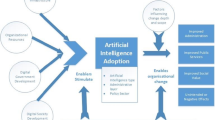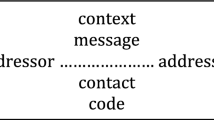Abstract
Considerable attention has been given to the accessibility of legal documents, such as legislation and case law, both in legal information retrieval (query formulation, search algorithms), in legal information dissemination practice (numerous examples of on-line access to formal sources of law), and in legal knowledge-based systems (by translating the contents of those documents to ready-to-use rule and case-based systems). However, within AI & law, it has hardly ever been tried to make the contents of sources of law, and the relations among them, more accessible to those without a legal education. This article presents a theory about translating sources of law into information accessible to persons without a legal education. It illustrates the theory by providing two elaborated examples of such translation ventures. In the first example, formal sources of law in the domain of exchanging police information are translated into rules of thumb useful for policemen. In the second example, the goal of providing non-legal professionals with insight into legislative procedures is translated into a framework for making available sources of law through an integrated legislative calendar. Although the theory itself does not support automating the several stages described, in this article some hints are given as to what such automation would have to look like.
Similar content being viewed by others
Notes
This requires careful and systematic planning. The commission uses a planning cycle consisting of Multiannual Strategic Objectives, an Annual Policy Strategy and Annual Working program. On the basis of this annual working program projects are selected for (preliminary and full) impact assessment (Road Maps). See Commission Decision of 15 November 2005 amending its Rules of Procedure (2005/960/EC, Euratom).
Source: the excellent summary in Wikipedia—procedural summary of the codecision procedure.
Judgment of the Court of 5 February 1963—NV Algemene Transport-en Expeditie Onderneming van Gend & Loos v Netherlands Inland Revenue Administration.—Reference for a preliminary ruling: Tariefcommissie—Pays-Bas.—Case 26–62.
Cf. iate.europa.eu.
References
Ajani G, Peruginelli G, Sartor G, Tiscornia D (eds) (2007) The multilanguage complexity of European law. Methodologies in comparison. European Press Academic Publishing, Florence
Ashley KD (1990) Modeling legal argument: reasoning with cases and hypotheticals. MIT Press, Cambridge
Bix B (1991) HLA Hart and the open texture of language. Law Philos 10:51–72
Buruma Y et al (2003) Jaarboek Wet politieregisters 2003. Deventer, Kluwer
Carr CS (2001) Computer-supported collaborative argumentation: supporting problem-based learning in legal education. In: Proceedings of Euro-CSCL 2001
Clercq S de (2004) Voorlichting in de juridische dienstverlening. Bussum, Coutinho
Dini L, Liebwald D, Mommers L, Peters W, Schweighofer E, Voermans W (2005) Cross-lingual legal information retrieval using a WordNet architecture. In: Proceedings of ICAIL ‘05. ACM Press, New York, NY, 163–167
Frege G (1892) Über Sinn und Bedeutung. In Zeitschrift für Philosophie und philosophische Kritik 1892, 25–50
Hage JC (1997) Reasoning with rules. An essay on legal reasoning and its underlying logic. Kluwer, Dordrecht
Hage JC, Leenes RE, Lodder AR (1993) Hard cases: a procedural approach. Artif Intell Law 2(1):113–167
Hart HLA (1961) The Concept of law. Oxford University Press, Oxford (ninth impression 1978)
Hoogwater S (2005) Beeldtaal voor juristen. Den Haag, Sdu uitgevers
Koelewijn WI, Kielman HH (2006) Agenten voor agenten. Slimme software ter ondersteuning van menselijk handelen. In: Huisman W, Moerings LM, Suurmond G (eds) Veiligheid en recht. Nieuwe doelwitten en strategieën. Boom Juridische Uitgevers, Den Haag, pp 231–255
Kralingen RW van (1995) Frame-based conceptual models of statute law, Ph.D. thesis, Leiden University
Laarschot R van, Steenbergen W van, Stuckenschmidt H, Lodder AR, Harmelen F van (2005) The Legal concepts and the layman’s terms. Proceedings of the 18th annual conference on legal knowledge and information systems, IOS Press, Brussels, December 8–10
Langen C (2005) Methodiek sociaal juridische dienstverlening. Soest, Nelissen
Leenes RE (1998) Hercules of Karneades, Hard cases in recht en rechtsinformatica, dissertatie UT, Enschede: Twente University Press
Lodder AR (1998) DiaLaw. On legal justification and dialog games. Ph.D. thesis, Maastricht University
Loth MA (1988) Handeling en aansprakelijkheid in het recht. Ph.D. thesis, Leiden University
Loth MA (1992) Recht en taal; een kleine methodologie. Arnhem
Loth MA (2002) Tussen eenheid en verscheidenheid: contextualisme in taal, wetenschap en samenleving. In: Gaakeer AMP, Loth MA (eds) Eenheid en verscheidenheid in recht en rechtswetenschap (28). Kluwer/Sanders Instituut, Deventer/Rotterdam, pp 19–43
Matthijssen LJ (1999) Interfacing between;lawyers and computers: an architecture for knowledge-based interfaces to legal databases. Kluwer Law International, Den Haag
McCarty LT (1989) A language for legal discourse, I. Basic features, Proceedings of the second international conference on artificial intelligence and law, Vancouver, Canada, pp 180–189
Mommers L (2002) Applied legal epistemology: building a knowledge-based ontology of the legal domain. Ph.D. thesis Leiden University
Mommers L, Voermans WJM (2005) Using legal definitions to increase the accessibility of legal documents. In: Moens M-F, Spyns P (eds.) (2005). Legal knowledge and information systems. Jurix 2005: the eighteenth annual conference, 147–156
Muntjewerff AJ (2001) An instructional environment for learning to solve legal cases PROSA. Amsterdam, UvA, Ph.D. thesis
Perelman Ch (1977) The idea of justice and the problem of argument. Routledge and Kegan Paul, London
Pessers DWJM (1999) Liefde, solidariteit en recht, Ph.D. thesis, University of Amsterdam
Prakken H (1997) Logical tools for modelling legal argument: a study of defeasible reasoning in law. Kluwer, Dordrecht
Putnam H (1975) The meaning of ‘meaning’. In: Gunderson K (ed) Language, mind, and knowledge, Minnesota studies in the philosophy of science, vol VII. University of Minnesota Press, Minneapolis, pp 131–193
Roest OAP van der (2006) Basisboek Recht. Wolters-Noordhoff
Scholten P (1974) Mr. C. Asser’s handleiding tot de beoefening van het Nederlands burgerlijk recht. Algemeen deel. Zwolle, W.E.J. Tjeenk Willink
Schreuders E, Wel H Van der (2005) Evaluatie wet bijzondere politieregisters. Deel II. De Wet bijzondere politieregisters in de praktijk. Den Haag, WODC
Termorshuizen-Arts M (2003) Juridische Semantiek. Een bijdrage tot de methodologie van de rechtsvergelijking, de rechtsvinding en het juridisch vertalen. Wolf Legal Publishers, Nijmegen
Toulmin S (1958) The uses of argument. Cambridge University Press, Cambridge
Schooten H van (2000) Van bevel naar communicatie: naar een nieuwe legitimering van het recht?. In: Klink B van, Witteveen V (eds.) (2000) De overtuigende wetgever, Schoordijk Reeks. Deventer, Tjeenk Willink, p 71–86
Schooten H van (2001) The Declaration of War in the Dutch Constitution and Models of Legal Communication. Int J Semiot Law 14(4):329–344
Verheij HB (1996) Rules, Reasons, Arguments. Formal studies of argumentation and defeat. Ph.D. thesis, Maastricht University
Voermans WJM (1995) Sturen in de mist…, maar dan met radar. Een onderzoek naar praktisch haalbare vormen van computerondersteuning bij het ontwerpen van regelingen. Zwolle, Tjeenk Willink
Voermans WJM (2004) Weten van wetgeving. RegelMaat 2004(5):155–160
Vranken JBM (1995) Mr. C. Asser’s handleiding tot de beoefening van het Nederlands burgerlijk recht. Algemeen deel. Zwolle, W.E.J. Tjeenk Willink
Waismann (1952) Verifiability. In: Flew A (ed) Logic and language, vol 1. Blackwell, Oxford
Winkels RGF, Boer A, Breuker JA, Bosscher D (1998) Assessment based legal information serving and co-operative dialogue in CLIME. In: Hage JC, Bench-Capon TJM, Koers AW, Vey Mestdagh CNJ de, Grütters CAFM (eds) (1998) Proceedings of JURIX-1998. Nijmegen: GNI, p. 131–146
Winkels RGF, Boscher DJB, Boer AWF, Breuker JA (1999) Generating exception structures for legal information serving. In: Proceedings of the 7th international conference on artificial intelligence and law, Oslo, Norway, p 182–189
Wittgenstein L (1953) Philosophical investigations. Blackwell, Oxford (translated from Philosophische Untersuchungen by G.E.M. Anscombe)
Acknowledgments
We would like to thank the Faculty of Law of Leiden University for allowing us to carry out explorative research into legal knowledge dissemination. In addition, we would like to thank three anonymous ICAIL referents for their valuable remarks on the previous version of this article. Finally, the research on the distribution of police data, used as an example in this article, is funded by the ToKeN program of the Research Council for Physical Sciences, part of The Netherlands Organization for Scientific Research, under number 634.000.017.
Author information
Authors and Affiliations
Corresponding author
Rights and permissions
About this article
Cite this article
Mommers, L., Voermans, W., Koelewijn, W. et al. Understanding the law: improving legal knowledge dissemination by translating the contents of formal sources of law. Artif Intell Law 17, 51–78 (2009). https://doi.org/10.1007/s10506-008-9073-5
Received:
Accepted:
Published:
Issue Date:
DOI: https://doi.org/10.1007/s10506-008-9073-5




